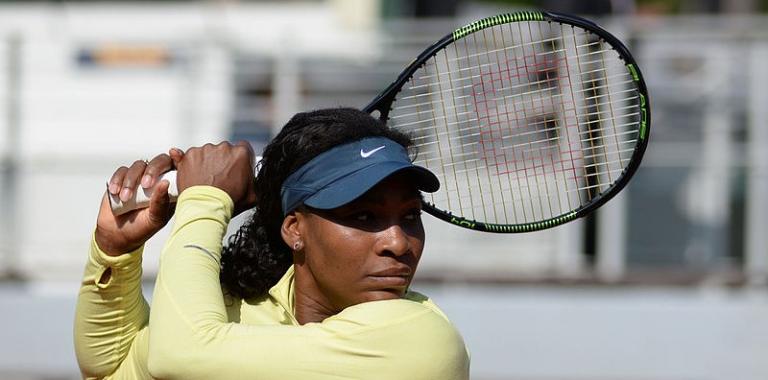
Tennis has always been an aristocrats’ game. It’s like golf. You take your prospective business clients to play tennis at the country club when you need to close a deal. If you’ve really made it to the top, your backyard will have a tennis court in addition to a swimming pool. I grew up in the white aristocrat world of tennis. My grandparents had a court in their backyard. I played it on the grass courts at the country club. I had a European instructor named Olaf.
When I was learning to play tennis thirty years ago, the long-haired “rebel” Andre Agassi created a controversy by wearing something other than the traditional white on white outfits that were always a Wimbledon custom. It’s rude to yell at a tennis match. You’re supposed to clap lightly when a match is well-played. Tennis is not supposed to be a game for girls from Compton.
I’ve seen a lot of white men crowing over the controversy of Serena Williams’ US Open finals match. What is this world coming to that black women can get away with bad sportsmanship just because they play the race and gender card? If a white man did that, everyone would say he was an entitled asshole. Etc.
Both sides of the debate argue that there’s a double-standard at play. White men are saying that women of color can get away with anything in the court of public opinion because if they’re criticized, it’s racism, while black women point out that white male tennis players (like John McEnroe) have done far worse than what Serena Williams did without the same consequences.
The tragedy is that the umpire Carlos Ramos put the whole outcome of the match in question by punitively awarding a game to Naomi Osaka. Whether Serena Williams’ behavior was appropriate or not, Carlos Ramos undermined the legitimacy of the 2018 US Open with his decision. I can’t think of any other sporting event where points were literally put on the board as a result of an argument with an official. You can get a technical foul in basketball or a 15 yard penalty in football, but the players always have to earn the points that they score.
As I was thinking about the controversy today, I couldn’t help but notice how it related to something that I experienced this morning. I had to accompany my refugee friend to the immigration office, so I put on my nice shirt and tie, and I went. When I got to the front counter, I had a very assertive conversation with the official behind the counter because I saw that there were fifty people in the waiting room and I wanted to make sure that we didn’t wait three hours if all we really had to do was drop off some paperwork.
The official behind the counter got irritated with me, but I wasn’t deterred. Perhaps someone witnessing it would say that I was rude and entitled. If I had been an immigrant woman, I would almost certainly have been yelled at and possibly handcuffed and deported for talking the way I did. But I wasn’t an immigrant woman. I was a white man. So the guy called me back up to the counter five minutes later, thus letting me cut in line in front of fifty people, and we were done. Because I was an assertive white man with a tie.
I didn’t have to raise my voice in my interaction with the official because he didn’t have any power over me. All the immigrants in the room were at his mercy because they could be deported at his discretion. To me, he was a mere clerk. All this is just to say that there is an inverse relationship between how much power we have and how much we have to raise our voice to be heard.
My friend AnaYelsi Velasco-Sanchez posted something today about how differently the world looks to her because of her background as a woman of color:
When you’re brown, Latina, fat, a woman, and grew up lower-class you can’t speak. You can’t feel. Every instinct to express yourself is weighed against these questions: What stereotype am I fueling? Will I “intimidate” myself out of a job? a friendship? a relationship? Will this prove I really am too much? Not enough?
I read that earlier today and I couldn’t stop thinking about it. AnaYelsi is such a beautiful, wise, compassionate person. It kills me to know that she’s always having to watch herself like that. If she speaks a little too honestly, will some white girl burst into tears and make her the bitch? If she talks the way I do every day without a second thought, she turns into an “intimidating” angry brown woman.
So perhaps instead of crowing about the “injustice” when women of color are defended vigorously in the court of public opinion, my fellow white men can think about the people of color in our lives who might be speaking guardedly and holding themselves back because they’re genuinely afraid of how we might react. It’s very likely that each of us have “black friends” who have grimaced and kept it to themselves when we did things that hurt them because the cost would have been too high to speak up.
Instead of sharing racist cartoons and snarky memes on the internet, what if white men reflected on how we can make our community safer for people who live under a magnifying glass and have to be twice as soft-spoken and perfectly poised at all times in order to get credit for being one of the “good ones” among their race? Read what black women and other women of color have to say about their experiences. Especially read Austin Channing Brown’s I’m Still Here: Black Dignity in A World Made For Whiteness.
This isn’t about debating who’s right and who’s wrong; this is about creating a world where all people feel safe and empowered to speak their minds. I want to live in a world where poor women of color have as much power and freedom to speak their minds as rich white guys with ties. I don’t see why that should be controversial to anyone.
Here are some women of color whose work you should follow if you want to learn more:
















